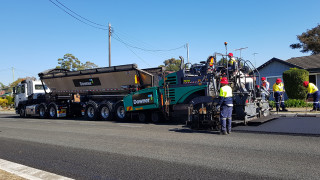What is claimed to be the world’s first plastic bike path recorded its millionth crossing this week following its installation in the Netherlands in 2018. The team behind it said that the technology is now ready to be launched on the market after over one and half years of testing, learning and continued development into a design suited for industrial production. The PlasticRoad is now available for order, with initial deliveries being made in the first quarter of 2021.
Industrial manufacture of the PlasticRoad will start in the first quarter of 2021. The prefab, modular and hollow product is made from recycled plastics and has been developed by KWS, Wavin and Total.
The team said that PlasticRoad has proven able to handle heavy loads, offers an effective solution for water management with heavy precipitation and periods of drought and holds up under a wide range of conditions.
Team members Marcel Jager and Anne Koudstaal said in a statement: “Working together with our clients, we have proven that our ground-breaking circular concept – a prefab road based on recycled plastic – is feasible in practice. An initiative that started in 2018 with two pilot projects is now ready for industrial production – a feat that we are incredibly proud of.”
Each of the two 30m pilot cycle paths in the Netherlands contains about 1,000 kilograms of recycled plastics, the equivalent of 218,000 plastic cups. The pilot version of the PlasticRoad cut CO₂ emissions by some 50% to 70% compared to conventional bike paths made from asphalt or concrete slabs, said the team. Next year, the percentage stands to increase when the finalised design is taken into industrial production.
At the time of their installation, both test tracks in Zwolle and Giethoorn were fitted with sensors that enabled 24/7 monitoring of the product’s use and ‘behaviour’. The most important conclusion that could be drawn from the two pilot projects is that the PlasticRoad can also handle heavy traffic. It has become clear from practical tests and data that the PlasticRoad is also a match for heavier loads like refuse lorries and maintenance vehicles, said the developers. Further improvements to the design mean that the marketed version will be more rugged and stronger than the test sections laid in Zwolle and Giethoorn, making it suitable for applications including car parks. The team is preparing the first pilot project for a car park, adding that the eventual installation of the first PlasticRoad for cars and other road traffic has become more likely than ever.

Meanwhile, in Australia the New South Wales (NSW) Environment Protection Authority has approved the use of Downer’s Reconophalt road surfacing material. The approval of Reconophalt, which incorporates recycled soft plastics, follows 18 months of testing, including the potential for leaching of BPA and release of microplastics. “We have proven Reconophalt brings no increased environmental risk while providing considerable sustainability and performance benefits,” said Downer.
Reconophalt can contain high recycled content from materials such as soft plastics, toner, glass and reclaimed road.
The materials are sourced through community programmes such as RedCycle soft plastics collection in Coles and Woolworths supermarkets nationally, and Plastic Police, which collect soft plastics from schools, councils and businesses in NSW. Similarly, toner is collected from used printer cartridges from the community via the Cartridges 4 Planet Ark programme. In addition, Downer can use waste glass that is destined for landfill and reclaimed asphalt pavement from end-of-life roads.
Reconophalt was first trialled to construct a local road in Craigieburn, Victoria, in 2018. This same asphalt has now been used by customers in the Australia Capital Territory, New South Wales, South Australia, Tasmania and Western Australia.
“We have invested significantly in research and development over a long period of time and I am incredibly proud of our team’s commitment to deliver a product that is environmentally safe, sustainable and outperforms standard asphalt,” said Downer’s general manager – pavements, Stuart Billing. “Even after a road has been laid with Reconophalt, the pavement is perpetually recyclable, providing a truly circular and sustainable solution for communities and generations to come. To us, it’s all about pulling products, not pushing waste.”
Got a story? Email news@theconstructionindex.co.uk



